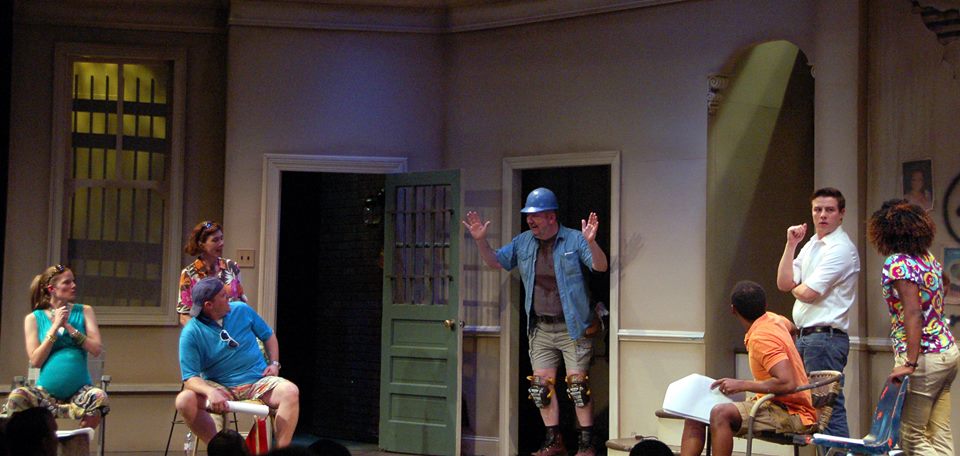 Bruce Norris's Clybourne Park, currently running on the Thigpen Main Stage at Trustus Theatre, is by definition an important play; any winner of a Tony Award, an Olivier Award (England's Tony) and the Pulitzer Prize for Best Play, automatically commands and deserves attention. The show is also an unofficial (but direct) sequel to Lorraine Hansberry's groundbreaking A Raisin in the Sun, one of the earliest dramas to realistically address issues facing modern African-American families. Raisin was nominated for multiple Tonys too, won the NY Drama Critics' Circle Award for Best Play in 1959, and ran for several years, appealing to both black and white audiences; its plot centered around a black family's plans to buy a house in a white Chicago neighborhood.
Bruce Norris's Clybourne Park, currently running on the Thigpen Main Stage at Trustus Theatre, is by definition an important play; any winner of a Tony Award, an Olivier Award (England's Tony) and the Pulitzer Prize for Best Play, automatically commands and deserves attention. The show is also an unofficial (but direct) sequel to Lorraine Hansberry's groundbreaking A Raisin in the Sun, one of the earliest dramas to realistically address issues facing modern African-American families. Raisin was nominated for multiple Tonys too, won the NY Drama Critics' Circle Award for Best Play in 1959, and ran for several years, appealing to both black and white audiences; its plot centered around a black family's plans to buy a house in a white Chicago neighborhood.
Clybourne Park's first act depicts the conflict that was meanwhile taking place in the sellers' living room, and its second act fast forwards to 2009, where the same actors play different characters engaged in similar wranglings over real estate that are really all about race and class. Well-written, well-crafted, and thought-provoking, Norris's script is also funny, disturbing, upsetting, provocative, and frustrating. Top-notch acting and direction ensure that the author's themes and issues are presented with clarity and eloquence, but the ultimate message may be that we have not progressed nearly as much as a society as we like to think.
In 1959, Bryan Bender, Lucas Bender, and Erica Tobolski portray a wholesome middle-class family who could be Ward and June Cleaver's neighbors. Their banal and affected chatter hides a family tragedy, which makes them eager to sell their home to the first bidder. Neighbors (G. Scott Wild and Rachel Kuhnle) and the local minister (Bobby Bloom) break the news that the buyers are a "colored" family, and drag the housekeeper and her husband (Ericka Wright and Wela Mbusi) into an increasingly volatile argument over integration. 50 years later, the neighborhood is considered traditionally African-American, and at risk of losing much of its cultural heritage to gentrification. Wild and Kuhnle now play high-strung yuppies who imagine themselves to be liberal and progressive, while Wright and Mbusi, representing the neighborhood association, are a seemingly pleasant, reasonable couple who discover how easily their buttons can be pushed when it comes to race. Norris seems to be saying that while these characters (and by implication, Americans) can co-exist peacefully in certain circumstances, at the same time there's much left unsaid, rather than ever honestly dealt with or resolved.
Norris's script makes good use of contemporary vernacular and modern speech patterns where people talk over one another and cut each other off mid-sentence. Director Jim O'Connor keeps action and dialogue flowing at light speed, and his cast excels in making every word seem natural. Several actors adopt believable Northern accents, although to my ear some sounded more reminiscent of Minnesota, a la the film Fargo, than the Chicago natives I've known, but there are references to the characters' German and Scandinavian roots, and the effect works either way. Tobolski's suburban Suzie Homemaker in the first act, clad in a lovely dress and a frilly apron, is almost a comic stereotype, but there's a legitimate reason for her demeanor. Bryan Bender is a master of Midwestern reserve in the first act, then switches to broad comedy in the second act as a whimsical and quirky workman. Kuhnle gets some of the sharpest barbs and meatiest character mannerisms to play with, while Wild's performance is the most believable and nuanced. His character is the only one in the second act to make some effort to address the real issues at hand, although he botches this attempt terribly. Still, his hapless frustration is likely to strike a familiar chord with many in the audience, as his attempts at political correctness reveal biases he never realized. Christian Thee's set design of a typical 1950's living room seems simple, indeed minimalistic, yet its inventiveness becomes apparent in the second act. Panels and units within the set are quickly replaced during intermission to seamlessly depict a half century of urban decay. Also of note is Baxter Engle's sound design: assorted cell phones, radio broadcasts, and unseen construction equipment sound exactly as they should.
While the script has many genuinely funny moments, it's ultimately a dark and wicked satire of society's attitudes and misconceptions about race, and a number of uncomfortable questions are raised, explored, yet never answered. Forcing an audience to think about, and sometimes laugh at, important topics that are more easily ignored is sufficient reason to admire and embrace Clybourne Park as a work of literature and social commentary. O'Connor and his cast add a necessary and welcome human touch, bringing difficult characters to believable life.
Clybourne Park runs on the Thigpen Main Stage at Trustus Theatre through Saturday, Feb. 8; contact the box office at 803-254-9732 for ticket information, or visit trustus.org/.
~ August Krickel
(This review also ran this week online at the Free Times.)


